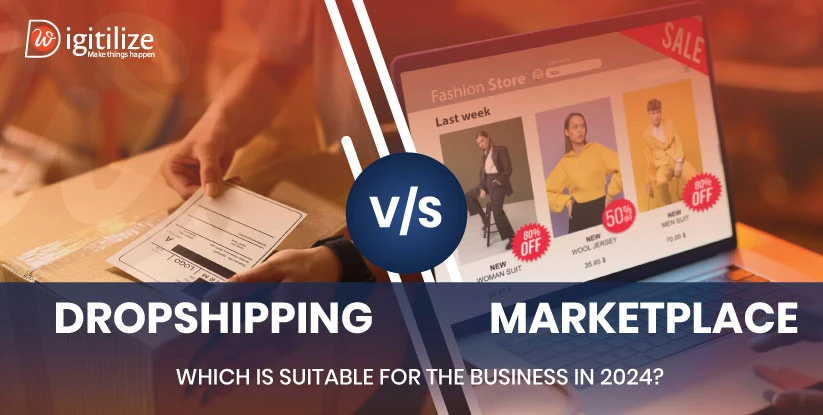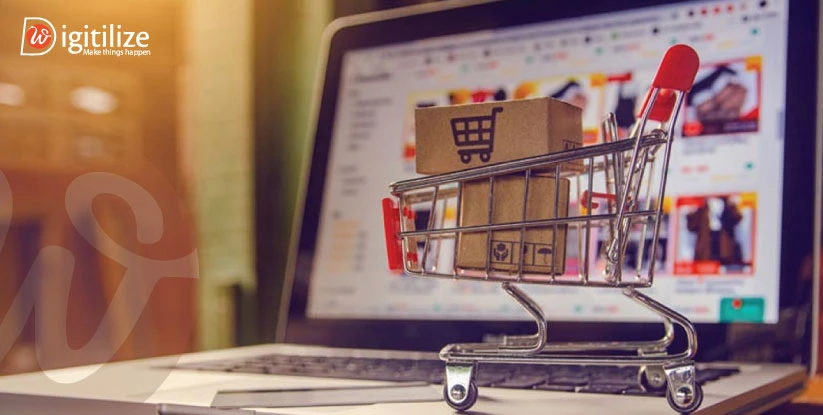Dropshipping vs. Marketplace – Which is suitable for the business in 2024?
 The most discussing topic is Dropshipping vs. Marketplace: Which is suitable for the business in 2024? Over the past ten years, access to the Internet has increased. Online payment methods have become safer, and delivery options have increased, increasing the appeal of online shopping. A rising number of businesses have started selling online due to the rise in demand for online shopping.
There are several business models to choose from when beginning an online venture in the rapidly increasing field of e-commerce. However, most business owners are getting confused between dropshipping and marketplace. Read our in-depth comparison article to understand the advantages and disadvantages of marketplace vs dropshipping for ecommerce: Which is suitable for the business in 2024? The dropshipping benefits for startups and the marketplace factors to consider while selecting.
Learn how to prioritize the customer experience and cost-effective marketing tactics to drive revenue if you want to succeed in the cutthroat internet market. With the correct information and resources, you may start your journey to a successful online company after properly weighing Dropshipping vs. marketplace.
The most discussing topic is Dropshipping vs. Marketplace: Which is suitable for the business in 2024? Over the past ten years, access to the Internet has increased. Online payment methods have become safer, and delivery options have increased, increasing the appeal of online shopping. A rising number of businesses have started selling online due to the rise in demand for online shopping.
There are several business models to choose from when beginning an online venture in the rapidly increasing field of e-commerce. However, most business owners are getting confused between dropshipping and marketplace. Read our in-depth comparison article to understand the advantages and disadvantages of marketplace vs dropshipping for ecommerce: Which is suitable for the business in 2024? The dropshipping benefits for startups and the marketplace factors to consider while selecting.
Learn how to prioritize the customer experience and cost-effective marketing tactics to drive revenue if you want to succeed in the cutthroat internet market. With the correct information and resources, you may start your journey to a successful online company after properly weighing Dropshipping vs. marketplace.
What is making business online, and why is it so vital for any business?
 Any possibility that arises as a Online business in 2024 opportunity must be taken advantage of. A global audience may be connected to and reached by your business thanks to its internet presence. Because your internet website can access all those locations that your physical business cannot.
Customers often visit your website before visiting physically, and that online visit is the decider move whether they will visit physically or not. Now consider the possibility of losing a potential consumer if you don’t have an online business. Having an online business has a lot of advantages.
Any possibility that arises as a Online business in 2024 opportunity must be taken advantage of. A global audience may be connected to and reached by your business thanks to its internet presence. Because your internet website can access all those locations that your physical business cannot.
Customers often visit your website before visiting physically, and that online visit is the decider move whether they will visit physically or not. Now consider the possibility of losing a potential consumer if you don’t have an online business. Having an online business has a lot of advantages.
- Can start with low investments.
- Promote properly.
- Always available
- Sale increase
- Flexible payment mode
What is dropshipping?
 Online merchants frequently employ drop shipping contracts with suppliers to buy, store, and transport their items to complete orders.
Dropshipping is the practice of selling items that a person or business does not really have in stock on their website. When a client puts an order, the firm sends it to another company to deliver the goods to the customer. Since they are middlemen, drop shippers may charge more.
Company owners frequently prefer this order fulfillment technique for efficiency and low prices. There can be a minor downside, especially regarding the customer experience.
The benefits of online business from the higher sale price goes to the drop-shipper. Because drop shipping relies on a third-party supplier, drop shipping businesses can be managed by one owner. So, Dropshipping vs. Marketplace: Which is suitable for the business in 2024? let discussing one this.
A dropshipping company advertises its goods and conducts online sales. A customer’s order is promptly sent to the drop shipper after being placed. The consumer is then told that their merchandise will soon arrive.
The procedure of fulfilling orders is outside the control of the company. The dropshipping supplier handles the shipment and maintenance of tangible products. Nevertheless, the company may handle customer service in specific agreements. A supplier and a business that serves customers together engage in dropshipping.
Online merchants frequently employ drop shipping contracts with suppliers to buy, store, and transport their items to complete orders.
Dropshipping is the practice of selling items that a person or business does not really have in stock on their website. When a client puts an order, the firm sends it to another company to deliver the goods to the customer. Since they are middlemen, drop shippers may charge more.
Company owners frequently prefer this order fulfillment technique for efficiency and low prices. There can be a minor downside, especially regarding the customer experience.
The benefits of online business from the higher sale price goes to the drop-shipper. Because drop shipping relies on a third-party supplier, drop shipping businesses can be managed by one owner. So, Dropshipping vs. Marketplace: Which is suitable for the business in 2024? let discussing one this.
A dropshipping company advertises its goods and conducts online sales. A customer’s order is promptly sent to the drop shipper after being placed. The consumer is then told that their merchandise will soon arrive.
The procedure of fulfilling orders is outside the control of the company. The dropshipping supplier handles the shipment and maintenance of tangible products. Nevertheless, the company may handle customer service in specific agreements. A supplier and a business that serves customers together engage in dropshipping.
Advantages of the Dropshipping
Dropshipping could be the solution if you are a startup or an entrepreneur wishing to launch an online store and sell goods without inventory. Dropshipping is a fantastic solution for new businesses or small business owners who lack inventory space or cannot manage shipping or item delivery. Here are some dropshipping advantages:- Numerous product options
- Scalability
- Lower start-up expenses
- Flexibility
Challenges of the Dropshipping
- Managing suppliers takes time.
- Less control over satisfaction
What is the marketplace?
 Multiple retailers are housed in an ecommerce platform. Providing a route for other businesses to sell their goods is all that a marketplace has to accomplish; it need not maintain any inventory of its own. The retailers are then responsible for facilitating transactions and completing each order. Marketplaces are appealing because you may expand your product availability and selection at a substantial scale without considerably raising overhead.
A well-known illustration of an online marketplace that doesn’t have its inventory is eBay. Despite its enormous popularity, Amazon has a product line that is listed apart from that of other sellers.
Here is how a marketplace functions, using Amazon Marketplace as an illustration:
Multiple retailers are housed in an ecommerce platform. Providing a route for other businesses to sell their goods is all that a marketplace has to accomplish; it need not maintain any inventory of its own. The retailers are then responsible for facilitating transactions and completing each order. Marketplaces are appealing because you may expand your product availability and selection at a substantial scale without considerably raising overhead.
A well-known illustration of an online marketplace that doesn’t have its inventory is eBay. Despite its enormous popularity, Amazon has a product line that is listed apart from that of other sellers.
Here is how a marketplace functions, using Amazon Marketplace as an illustration:
- The consumer uses Amazon to order a six-pack of Athletic Brewing.
- Amazon deducts a percentage of the order money as a commission. It delivers the order to Athletic Brewing and the remaining cash. Athletic accepts it as one of its orders.
- Athletic sends the 12-pack straight to the buyer after packing it in Athletic packaging.
- It is delivered to the client as if it were a product of Athletic.
Advantages of Marketplace
- Have a wide range of customers.
- Less customer handling.
- Automation
- Increase the sale.
Challenges of Marketplace
- Price variations
- Brand loyalty
Is dropshipping better than the marketplace?
 Dropshipping and marketplace are two distinct business methods, each with pros and cons. The best model for your company will rely on your tastes and aims.
When dropshipping, the vendor purchases the products from a different provider. They may avoid managing the inventory this way. The order is deliver to the supplier, and it is then send directly to the customer. Consequently, the supplier won’t need to manage inventories. In the end, this reduces overhead expenses and makes it possible for a more adaptable company strategy.
Dropshipping, however, also refers to the seller’s ability to regulate the product’s quality and the delivery procedure.
On the other hand, Marketplace describes any business transaction carried out online. It can also refer to various business models where the seller oversees the shipping process, keeps inventory, and drops shipping. More control over product quality and shipping options is provided by marketplace. The disadvantage is that it necessitates a more significant initial outlay and overhead expenses.
Dropshipping and the marketplace have benefits and drawbacks, so you must decide which is ideal for you by weighing those factors. Dropshipping vs. Marketplace: Which is suitable for the business in 2024? This could be preferable if adaptability and low overhead costs are priorities. The market can be preferable if you strongly emphasize having control over the manufacturing and shipping processes. Drop shipping can be preferable for a newcomer with cheap initial expenses.
Dropshipping and marketplace are two distinct business methods, each with pros and cons. The best model for your company will rely on your tastes and aims.
When dropshipping, the vendor purchases the products from a different provider. They may avoid managing the inventory this way. The order is deliver to the supplier, and it is then send directly to the customer. Consequently, the supplier won’t need to manage inventories. In the end, this reduces overhead expenses and makes it possible for a more adaptable company strategy.
Dropshipping, however, also refers to the seller’s ability to regulate the product’s quality and the delivery procedure.
On the other hand, Marketplace describes any business transaction carried out online. It can also refer to various business models where the seller oversees the shipping process, keeps inventory, and drops shipping. More control over product quality and shipping options is provided by marketplace. The disadvantage is that it necessitates a more significant initial outlay and overhead expenses.
Dropshipping and the marketplace have benefits and drawbacks, so you must decide which is ideal for you by weighing those factors. Dropshipping vs. Marketplace: Which is suitable for the business in 2024? This could be preferable if adaptability and low overhead costs are priorities. The market can be preferable if you strongly emphasize having control over the manufacturing and shipping processes. Drop shipping can be preferable for a newcomer with cheap initial expenses.
Conclusion
You will select marketplace vs dropshipping for ecommerce: Which is suitable for the business in 2024? based on your preferences and circumstances. If you want a low-cost, low-risk option with a wide range of products, think about drop shipping benefits for startups. If you’re willing to invest money in inventory and storage in return for more control over your product offers, the market is preferable. You can consider our ecommerce development services in UK to make a significant entry to the digital world. Also follow us on: LinkedInFAQ
Frequently Asked Questions
Indeed, dropshipping is profitable even in 2024. Dropshipping offers a lower risk and barrier to entry than traditional retail, making it an attractive option for individuals who are wanting to start or currently run an ecommerce agency.
For beginners, both systems have advantages. Marketplaces are best for individuals who wish to use well-established channels to quickly reach a wide audience, while dropshipping is fantastic for those who desire little risk and flexibility.
The most common online payment methods include credit/debit cards, digital wallets (such as PayPal, Apple Pay, and Google Pay), bank transfers, and cryptocurrencies (like Bitcoin).
Common delivery options include standard shipping, expedited shipping, same-day delivery, next-day delivery, international shipping, click-and-collect (in-store pickup), and drop-off locations.
Popular platforms for building e-commerce marketplaces include Magento, Shopify Plus, WooCommerce, BigCommerce, and custom solutions using frameworks like Laravel or Node.js. To know more contact us!
Offer multiple support channels, including live chat, email, phone support, and comprehensive FAQs. Ensure timely and effective responses to customer inquiries.

